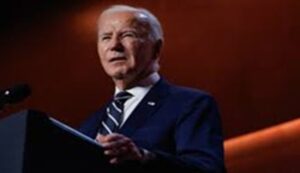US President Joe Biden said he does not think there is going to be an “all-out war” in the Middle East
Washington: President of the United States Joe Biden said that he did not think there would be an “all-out war” in the Middle East as Israel considers its options for retribution after Tehran’s most significant attack on its longtime foe.
However, as Israel’s military attacked Beirut with fresh airstrikes in its campaign against Lebanese armed organization Hezbollah, Biden said that more needed to be done to prevent a Middle East conflict.

When asked by reporters in Washington on Thursday, October 3, how certain he was that a conflict of that kind could be avoided, Biden said, “How sure are you that it won’t rain? Look, I don’t think a full-scale conflict is going to break out. We can probably prevent that.
“But there is a lot to do yet, a lot to do yet.”
Biden said that the US was debating with Israel its options for retaliating to Tehran’s attack, which included Israel targeting Iran’s oil infrastructure, even though the US, the EU, and other allies had asked for an immediate 21-day truce in the Israel-Lebanon war.
“We’re talking about that,” Biden said to the press.
His remarks fueled an increase in oil prices throughout the world, and growing tension in the Middle East has traders concerned about possible interruptions to supplies.
Biden did, however, add, “There is nothing going to happen today.” Later, when questioned about whether he was advising Israel not to strike Iran’s oil facilities, Biden said he would not engage in open talks.
The president said on Wednesday that he would oppose any Israeli attack on Iran’s nuclear facilities.
Israel’s ambassador to the UN, Danny Danon, told CNN on Thursday that his nation will “soon” demonstrate its might to Tehran and that it has “a lot of options” for response.
According to a US official, Washington did not think Israel had chosen its course of action against Iran yet.
Hezbollah’s stronghold in Beirut’s southern neighborhood of Dahiye, which is supported by Iran, saw further attacks on Thursday night after midnight after Israel gave the order for inhabitants to evacuate several areas, according to locals and security sources.
Assassinated Hezbollah leader Hassan Nasrallah’s alleged successor, Hashem Safieddine, was the target of airstrikes on a subterranean bunker, according to Axios writer Barak Ravid on X, who cited three Israeli authorities.
He added that Safieddine’s future was uncertain.
The Israeli military chose not to respond.
Israel said that on Thursday, Hezbollah fired over 230 missiles into Israel from Lebanon.
Hezbollah claimed to have fired a volley of rockets against what it referred to as Israel’s “Sakhnin base” for military industry near Haifa Bay on the northern Mediterranean coast of Israel.
Hezbollah claimed late on Thursday that it had also fired a volley of Fadi 2 rockets into Israel’s “Nesher base” near Haifa.
G7 DEMANDS RESTRAINT
Benjamin Netanyahu, the prime minister of Israel, said that Iran would bear the cost of Tuesday’s missile strike, while the United States said it will cooperate with its longstanding partner to guarantee that Iran would suffer “severe consequences”.
Masoud Pezeshkian, the president of Iran, said on Thursday in a speech in Doha that Tehran will be prepared to reply.
“Any type of military attack, terrorist act or crossing our red lines will be met with a decisive response by our armed forces,” stated the president.
Israel, which has been battling Hamas in Gaza for over a year, moved soldiers into southern Lebanon on Tuesday in response to two weeks of heavy bombings in an increasingly dangerous battle that has included Iran and the United States.
The US, Britain, and other members of the Group of Seven, which also includes allies, denounced Iran’s Tuesday missile strike and reiterated their support for Israel’s security on Thursday.
However, the organization also demanded moderation, an end to hostilities in Lebanon, and a truce in Gaza.
“A dangerous cycle of attacks and retaliation risks fuelling uncontrollable escalation in the Middle East, which is in no one’s interest,” the statement said.
In an attempt to halt what he described as Israel’s assault, Qatar’s Emir, Sheikh Tamim bin Hamad Al-Thani, also called for genuine peace measures.
On Thursday, the US president was requested by the head of the House of Representatives Foreign Affairs Committee to expedite the shipment of weapons to Israel, including 907 kg of explosives that had been delayed for months due to human rights concerns.
A 2,000-pound bomb has a large explosion radius and can tear through metal and strong concrete.
In a letter to Biden that was seen by Reuters, Representative Michael McCaul said that the fact that Hezbollah and Hamas were employing deeply underground bunkers and tunnels made the use of such massive bombs tactically vital.
IT KILLED 17 ISRAELI TROOPS, SAYS HEZBOLLAH
According to Israel, the goal of its operations in Lebanon is to enable tens of thousands of its residents to return home after being forced to flee their country’s north by Hezbollah bombing during the Gaza conflict.
Israeli assaults have resulted in the displacement of over 1.2 million Lebanese, and since the attacks began a year ago, approximately 2,000 people have died in Lebanon, the majority of them in the previous two weeks, according to Lebanese officials.
Lebanon’s health ministry said early on Friday that there had been 151 injuries and 27 fatalities the day before.
Hezbollah claims that by using tactics like ambushes and direct confrontations, it has thwarted many Israeli army field assaults.
Citing its field and security sources, the organization claimed to have killed 17 Israeli military troops on Thursday during action in southern Lebanon. The assertion was not addressed by Israeli military.
The Palestinian health ministry said that at least eighteen individuals were killed by an Israeli attack on Thursday in the Tulkarm refugee camp in the occupied West Bank. Israel claimed to have killed a Hamas leader in Tulkarm.